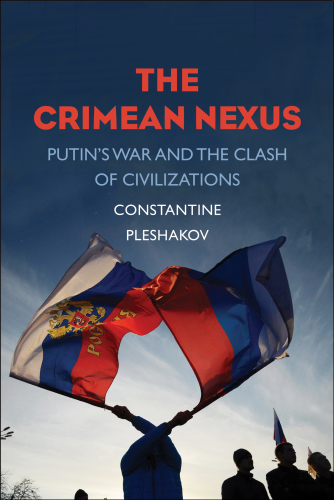
The Crimean Nexus
Putin's War and the Clash of Civilizations
کتاب های مرتبط
- اطلاعات
- نقد و بررسی
- دیدگاه کاربران
نقد و بررسی

November 28, 2016
The West “sleepwalked” into the present Ukrainian crisis, according to policy analyst and Crimean native Pleshakov (There Is No Freedom Without Bread!). Ukraine—unevenly influenced by European, Russian, and Turkic cultures—became an unstable “state without a nation” after the Soviet Union’s collapse. Advocates for NATO enlargement then stoked Russian resentment and insecurities over the “near abroad” regarded as their sphere of influence. Pleshakov lucidly outlines Ukrainian history and recent precarious status as an oligarch-dominated borderland. He asserts that America’s clumsy intervention in Ukraine’s 2013–14 political crisis prompted Russia’s aggressive response. He then considers Crimea, a virtual island in the Black Sea, which was casually attached to Ukraine during the Soviet era. For Russians, Crimea is a “fetish,” evoking strong cultural and historical associations and strategic ambitions for ports and pipelines. After presenting Russia’s motivations, Pleshakov explains how it conquered Crimea in a “hybrid war” of commandos, cyber-attacks, and para-military groups that paralyzed the Ukrainian “failing state.” Yet the Kremlin “miscalculated” by subsequently promoting the separatist insurgency in Ukraine’s Donbass region, leading to sanctions and unleashing “violent rabble” who may someday threaten Putin. Pleshakov skillfully argues that NATO’s ill-considered encouragement of pro-Western factions weakens the alliance by revealing its limited will and ability to respond to resulting crises.

January 1, 2017
Crimea, the peninsula hanging by a thread via the Isthmus of Perekop to Ukraine and jutting into the Black Sea, and now part of Russia, has a long history of invasion, displacement, and migration, both forced and voluntary. From the Ottomans and Huns through the Soviet era to today's dispute between Russia and "The West," Crimea has changed hands and demographics. Though at times subtly biased toward the West, Pleshakov (political science, Amherst Coll.; coauthor, The Flight of the Romanovs) presents a concise history of Crimea, its people, and cultural, economic, and military significance with academic thoroughness and a local's insight. The effects of the recent annexation are examined both in the context of larger regional relationships, including potential long-term challenges to Russian energy contracts with the European Union and global stability, and in local terms through the devastating reductions to the power and water supply, and substantial losses to the local economy. In the end, as with most geopolitical issues, the citizens are the ones most affected and left living with the consequences. VERDICT This informative history of Crimea will appeal to those interested in geopolitics, Ukraine, Russia, and the "New Cold War."--Zebulin Evelhoch, Central Washington Univ. Lib., Ellensburg, WA
Copyright 2017 Library Journal, LLC Used with permission.

























دیدگاه کاربران